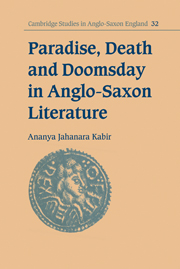Book contents
- Frontmatter
- Contents
- Preface
- List of abbreviations
- 1 Between Eden and Jerusalem, death and Doomsday: locating the interim paradise
- 2 Assertions and denials: paradise and the interim, from the Visio Sancti Pauli to Ælfric
- 3 Old hierarchies in new guise: vernacular reinterpretations of the interim paradise
- 4 Description and compromise: Bede, Boniface and the interim paradise
- 5 Private hopes, public claims? Paradisus and sinus Abrahae in prayer and liturgy
- 6 Doctrinal work, descriptive play: the interim paradise and Old English poetry
- 7 From a heavenly to an earthly interim paradise: toward a tripartite otherworld
- Select bibliography
- Index
6 - Doctrinal work, descriptive play: the interim paradise and Old English poetry
Published online by Cambridge University Press: 19 October 2009
- Frontmatter
- Contents
- Preface
- List of abbreviations
- 1 Between Eden and Jerusalem, death and Doomsday: locating the interim paradise
- 2 Assertions and denials: paradise and the interim, from the Visio Sancti Pauli to Ælfric
- 3 Old hierarchies in new guise: vernacular reinterpretations of the interim paradise
- 4 Description and compromise: Bede, Boniface and the interim paradise
- 5 Private hopes, public claims? Paradisus and sinus Abrahae in prayer and liturgy
- 6 Doctrinal work, descriptive play: the interim paradise and Old English poetry
- 7 From a heavenly to an earthly interim paradise: toward a tripartite otherworld
- Select bibliography
- Index
Summary
Geseh he geblowene bearwas standan blædum gehrodene, swa he ær his blod aget.
This picture of blossoming trees that spring up wherever Andreas's blood falls on the paved streets and rocky ground of Mermedonia seems to confirm the view that ‘in Old English literature, heaven is often confused with paradise’. The image brings to mind not only the regenerative powers of nature, but nature at its most ideal: the Garden of Eden. At the same time, the immediate context suggests that it offers us a glimpse of the postmortem reward that awaits the martyr. Is this reward the kingdom of heaven, or does the imagery of nature suggest, instead, the flowering, fragrance-filled meadow of the interim paradise?
In this chapter, I analyse the apparent confusion between images of paradise and those of heaven in Old English poetry as a response to two, contradictory pressures: the typological equation of paradise and heaven and the belief in an interim paradise, separate from heaven. In the previous chapter, we noted that the synonymy of paradise and heaven was part of the ‘learned self-fashioning’ of certain authors throughout the Anglo-Saxon period, and seemed to have been encouraged particularly within the intellectual climate of the Benedictine Reform. However, we have also seen that the very same authors who advocate this synonymy often resort to evasion and compromise to accommodate the idea of the interim paradise.
- Type
- Chapter
- Information
- Paradise, Death and Doomsday in Anglo-Saxon Literature , pp. 141 - 166Publisher: Cambridge University PressPrint publication year: 2001
- 1
- Cited by



